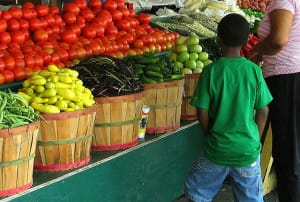The New York Times
by Stephanie Strom
 |
The United States Department of Agriculture plans to announce Monday that it will spend $52 million to support local and regional food systems like farmers’ markets and food hubs and to spur research on organic farming.
The local food movement has been one of the fastest growing segments of the business, as consumers seek to know more about where, how and by whom their food is grown.
But local farmers still struggle to market their food. Distribution systems are intended to accommodate the needs of large-scale commercial farms and growers. Grocery stores and restaurants largely rely on big distribution centers and are only beginning to figure out how to incorporate small batches of produce into their overall merchandise mixes.
Farmers’ markets are proliferating around the country, increasing 76 percent to 8,268 since 2008, according to the Agriculture Department, but they have trouble marketing themselves. And few consumers are aware of a website the department created to help them find a farmers market in their area.
“These types of local food systems are the cornerstones of our plans to revitalize the rural economy,” Tom Vilsack, the agriculture secretary, said in a telephone interview. “If you can connect local produce with markets that are local, money gets rolled around in the local community more directly compared to commercial agriculture where products get shipped in large quantities somewhere else, helping the economy there.”
The $52 million will be the first outlay to local and organic enterprises of the farm bill signed into law by President Obama in February, which tripled the amount of money aimed at that sector to $291 million. The organic business, which has long complained that the Agriculture Department does not support it financially, will get $125 million over the next five years for research and $50 million for conservation programs.
“It’s a really nice bump for us because we’ve been getting chump change for research,” said Mark Kastel, co-founder of the Cornucopia Institute, an organic research and advocacy group.
Still, Mr. Kastel said that given the growth in the organic business, with about $35 billion in sales in the United States last year, he wished there was more money to study organic practices.
The department will also be putting $30 million a year into marketing programs for farmers markets and promotion of locally grown foods, and has an additional $70 million available as a block grant to support more research on so-called specialty crops, or fruits and vegetables.
“These are significant increases over what it was before I became secretary and certainly over the 2008 bill,” Mr. Vilsack said, referring to the previous omnibus farm bill.
He said local food systems were good investments for government. “Small and medium-sized operations end up helping to generate more employment than commercial operations because of their different distribution systems and their local natures,” Mr. Vilsack said. “And food hubs hire about 20 people on average.”
Mr. Vilsack said there were about 300 food hubs around the country, and he is eager to see more. These enterprises, like Appalachian Sustainable Development in Virginia and La Montañita in New Mexico, help small farmers market and distribute their products and offer a variety of other services.

